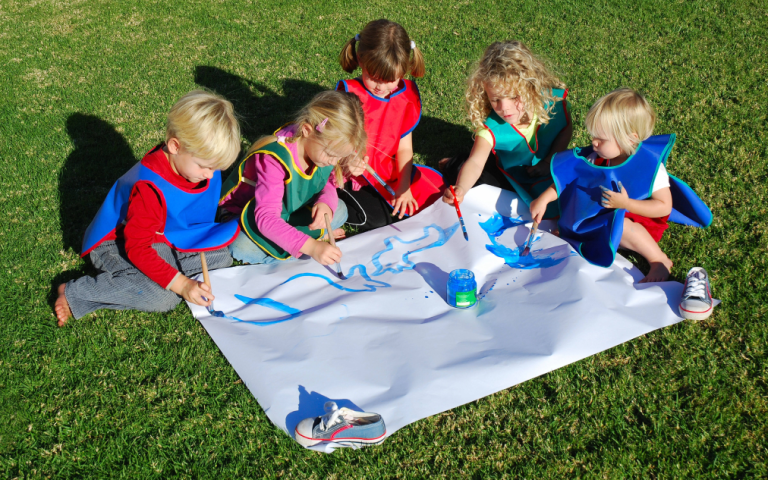Sarah Corbett is the creative force behind the Craftivist Collective, a social enterprise seeking to enact positive change in the world through Sarah’s unique strategy of “Gentle Protest”. Sarah has been practising and teaching Craftivism – the use of crafts as activism – for over a decade and has now published a Craftivist course with Alison to share her expertise for free with learners all around the world. Sarah spoke to the Alison Blog about how she became a Craftivist, her experience of publishing with Alison and the hopes she has for her first Alison course.
Hi Sarah, tell us a little bit about yourself!
My name is Sarah Corbett and I run the social enterprise Craftivist Collective. My background is in activism. I grew up in a low income area of the UK and campaigned as a young person with my family and community on local, national and global issues. I ended up working for big charities as a campaigner and activism manager, most recently with Oxfam GB. Now I do craftivism using my unique “Gentle Protest” methods full time through workshops, events, consultancy, teaching and free resources as well as books, kits and tools people can buy.
How did you become an expert in your field?
As a young person and at university, I was always involved in activism on local and national levels, as well as campaigning on global issues like apartheid in South Africa. When I became a professional campaigner, I noticed that a lot of traditional activism was very reactive and quite black and white in its delivery (i.e. ‘You are wrong, we are right’). I felt like we needed a variety of different tools in the activism toolkit and a gentler approach to interacting with power-holders so they could really hear what solutions were needed to tackle injustice. We need to know when to ask questions, rather than demand answers, when to be quiet as well as when to speak up, and to figure out how to really channel the anger and sadness we have about injustice into strategic, thoughtful and loving activism that is effective. At this time of doubting the effectiveness of activism, I started doing handicrafts, mostly sewing, cross-stitch and hand embroidery. I noticed that it calmed me down and helped me think more clearly about how to be an effective campaigner and I thought that this could be a really useful tool to add to the activism toolkit. Quite organically, I noticed that craft for activism could be really effective in lots of different ways to help campaign for social change.
Had you come across Alison before becoming a Publisher?
I came across Alison through the Ashoka Fellowship that I’m a Fellow of alongside the founder of Alison, who I just think is a brilliant human being. I heard his story at an event that we were both giving talks at and so I looked into what Alison was about. I just found it so inspiring the way Alison works in such an ethical, accessible and empowering way around the world. I felt really inspired by Alison and I thought that it really fitted my work and the audience I want to reach.
Why did you choose to publish with Alison?
I published a book called How to Be a Craftivist – The Art of Gentle Protest, which has sold thousands of copies around the world and received great feedback from readers, but I noticed that a lot of people wanted more support. After finding out about Alison, I thought an online course could really compliment the book. It felt like another tool in my craftivism toolbox that would really help build the movement and provide existing and new craftivists with the support that they needed to do effective “Gentle Protest” through craft.
Tell us a bit about the course you’re publishing.
My course is called an Introduction to Gentle Craftivism and it’s a consolidation of twelve years experience of how to effectively change hearts, minds, policies and laws around the world. It features lots of examples of how craftivism has helped people personally, as makers, and also how it’s helped engage power-holders like politicians and other people of influence to create real positive change. It teaches how to use craftivism in the public sphere as a catalyst for both conversation and action. It’s a really good introduction of how to use craft as a tool for “Gentle Protest”.
How did you find the experience of publishing with Alison?
I’m a perfectionist so I was a bit concerned that the Alison staff might be a bit annoyed with all of my questions. But the whole process was a really joyful one for me. I’ve got twelve years of craftivist experience so it was lovely to be able to gather all of that theory and practice and formulate it into a course that’s accessible to people all over the world. I wanted to make sure the course was as universal and timeless as possible, so it can be used in different contexts and different times for years to come. It was so helpful to have the Alison staff to really challenge me, to say ‘that doesn’t quite make sense’ or ‘can we make that a bit clearer?’ Lots of the time I wanted to squeeze in too much information, so it was really good to be able to get their regular feedback on simplifying the course so that it didn’t overwhelm people. By challenging each other we were able to make the best course possible. I really enjoyed the process and hope the staff did too.
What is the benefit of working with Alison?
For me, there are loads of benefits. The first one is that I want to reach a global audience, perhaps people who might not naturally come across my work and Alison is an amazing platform for that. It also provides great feedback for me to learn what people find helpful and what other support I may need to offer. Also, I run the Craftivist Collective as a social enterprise and, as activism is often unpaid, it’s hugely helpful to have this passive income stream to help me to keep my “Gentle Protest” craftivism sustainable. Also, the fact that it’s a free course, and that people can choose to pay for the certificate, is really important for me because I want my work to be accessible to people, regardless of their income limitations. So there were lots of benefits. It just felt like a really good alignment between two organisations that are trying to help make the world a better place and also work in a financially sustainable way.
What advice do you have for prospective publishers on Alison?
My advice is to make lots of time to do the course really well. I wanted to make sure that my course was as perfect and as helpful as possible. I want it to still be useful in ten years. So I really did make time to do it well and didn’t just try to squeeze it in at the end of a Friday each week. The other advice I’d give is just be really honest with the Alison staff. I said from the beginning that I wanted them to be brutally honest with me and to tell me if something wasn’t good enough or could written better. Have that mutual respect so you can really challenge each other to create a great course everyone is proud of creating.
What advice do you have for Alison’s learners?
For students of my own course, my hope is that they benefit from it personally and politically. Whether they end up joining some of my craftivism campaigns or whether they use elements of the course in their own “Gentle Protests”, I just hope it’s something they enjoy doing and that it’s useful to them. For students using Alison generally, my advice is, whether you’re doing my course or another course, you’ll probably end up with more questions than answers. There are so many more amazing courses on Alison so do see what other courses are out there to help you on your journey. Use the site as much as possible.
Why is free education so important?
Because education is power. The more knowledge we have, the more effective we can be as global citizens, as well as become better friends, family members and colleagues. To be able to access these resources online is vital if we want our world to be healthy, happy and harmonious for all.
How does free learning tie into your own project?
I try to make as much of my work as free as possible to people all over the world, while doing it in a sustainable way. Having resources available online for people to use for free, regardless of where you live or your income, is an incredible way to galvanise people to create a global “Gentle Protest” community and to help people on their journey as effective positive changemakers. So much of my work is about trying to contribute to society so it should be free where possible.
If you could learn anything at all from an Alison course, what would it be?
I’m fascinated by Neuroscience and Behavioural Psychology. I’m always reading lots of books on those topics because they influence my work and I’m just fascinated by human beings! So any excuse to do some courses in those fields would be a joy!









Sarah has a lot to teach the world about how to change things we don’t like about our world in a constant but impactful way. We get upset about injustice and inequality – Sarah tells us to not waste that emotion but use it, thoughtfully, relentlessly, chipping away until we achieve our ambitious goals!